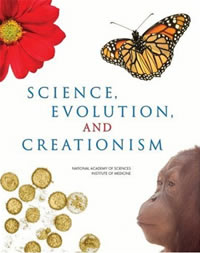Book Notes
 National Academy of Sciences and Institute of Medicine, Science, Evolution, and Creationism (Washington, DC: The National Academies Press, 2008), 70pp.
National Academy of Sciences and Institute of Medicine, Science, Evolution, and Creationism (Washington, DC: The National Academies Press, 2008), 70pp.
In this third edition of a booklet first published in 1984 for a general audience, a fifteen-person committee of science's most prestigious organization argues that "the evidence for evolution can be fully compatible with religious faith. Science and religion are different ways of understanding the world. Needlessly placing them in opposition reduces the potential of each to contribute to a better future."
In its three main chapters the booklet explores evolution and the nature of science, the evidence for biological evolution, and then creationist perspectives (including intelligent design), which are roundly rejected as science. Creationist perspectives might be taught in a comparative religions class, the authors argue, as long as differing creation stories from the major religions all receive equal and neutral treatment, but not as science and not as a way to "teach the controversy." The only controversy in science about evolution is not whether it happened but how. A section on nine FAQs and then a bibliography for further reading conclude the book.
A booklet this short raises all sorts of questions that can't be considered. Identifying creationists as young-earthers is problematic, although later the authors admit that the word is "a very broad term" that embraces "a wide variety of views" (pp. 37, 52). Praise is heaped upon science for its many advances and achievements, but there's nothing about the limits of science or its more inhumane accomplishments like nuclear weapons. In the understatement of the book it's admitted that the question of how life itself began is "a challenging scientific problem" that has garnered little consensus among scientists.
Still, it's refreshing for the NAS and the IM to admit that "science is not the only way of knowing or understanding" (p. 12). Although the brief bibliography includes Daniel Dennett's extremely polemical book Darwin's Dangerous Idea, it was nice to see readers also directed to The Language of God by Francis Collins (head of the Genome Project) and Finding Darwin's God by Kenneth Miller (a Christian biologist at Brown University). I wish they had also included the Christian contributions of Stanford biologist Joan Roughgarden, the Harvard astronomer Owen Gingerich, and the Cambridge physicist-turned-Anglican-priest John Polkinghorne. "Science can neither prove nor disprove religion," the authors admit on the last page. Since "many religious beliefs involve entities or ideas that currently are not within the domain of science, it would be false to assume that all religious beliefs can be challenged by scientific findings."


